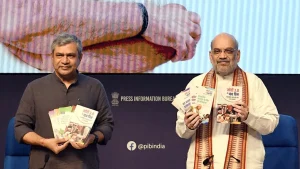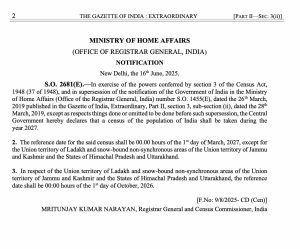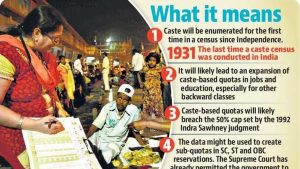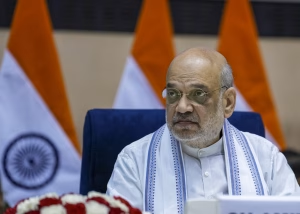New Delhi – Home Minister Amit Shah conducted a detailed review of preparations for the upcoming Census 2027 India with Union Home Secretary Govind Mohan and other senior officials on Sunday. This comprehensive assessment marks a crucial milestone in the preparation for what will be the most technologically advanced census in Indian history, incorporating digital methodologies and enhanced data security measures.
The Census 2027 India review meeting included participation from the Union Home Secretary, Registrar General & Census Commissioner of India Mritunjay Kumar Narayan, and other senior officials responsible for implementing this massive national undertaking. The meeting focused on ensuring all logistical, technological, and administrative preparations are completed before the official commencement of census activities.
Historic Significance: 16th Census Since Beginning

The Census 2027 India holds exceptional historical significance as it represents the 16th census since the beginning of systematic population counting in India and the 8th census conducted after Independence. This milestone underscores the continuity of India’s commitment to comprehensive demographic data collection and statistical analysis for national planning and development.
The timing of Census 2027 India is particularly noteworthy as it will be conducted after a gap of 16 years, with the last census completed in 2011. This extended interval between censuses makes the upcoming enumeration even more critical for understanding demographic changes, population trends, and socio-economic transformations that have occurred during this period.
Official Notification and Implementation Timeline


The Census 2027 India will officially commence with the publication of notification in the official gazette on Monday, marking the formal beginning of the census process. This notification will provide legal framework and administrative guidelines for conducting the comprehensive population enumeration across the entire country.
Also Read About The PM Modi Cyprus Visit: Launch Of Strategic Partnership with Powerful Agreements
The reference dates for Census 2027 India have been strategically determined to accommodate geographical and climatic variations across different regions. For snow-bound areas including the Union Territory of Ladakh and non-synchronous snow-bound regions of Jammu and Kashmir, Himachal Pradesh, and Uttarakhand, the reference date will be 00:00 hours of October 1, 2026.
For the rest of the country, Census 2027 India will use March 1, 2027, at 00:00 hours as the reference date for population enumeration. This dual-date approach ensures accurate data collection while accounting for accessibility challenges in mountainous and snow-affected regions during winter months.
Two-Phase Implementation Strategy
The Census 2027 India will be conducted through a systematic two-phase approach designed to capture comprehensive demographic and socio-economic information. This structured methodology ensures thorough data collection while maintaining operational efficiency and accuracy throughout the enumeration process.


Phase one of Census 2027 India, known as the Houselisting Operation (HLO), will focus on collecting detailed information about housing conditions, assets, and amenities of each household across the country. This phase will provide crucial insights into living standards, infrastructure availability, and housing quality that inform policy decisions related to urban planning and rural development.
The second phase of Census 2027 India, designated as Population Enumeration (PE), will involve collecting demographic, socio-economic, cultural, and other detailed information about every individual within each household. This comprehensive data collection will provide a complete picture of India’s population characteristics and social composition.
Caste Enumeration: A Significant Addition


One of the most significant features of Census 2027 India is the inclusion of caste enumeration, marking a departure from previous census practices. This addition reflects the government’s commitment to gathering comprehensive demographic data that can inform policy decisions related to social justice, affirmative action, and equitable development.
The caste enumeration component of Census 2027 India will provide detailed insights into the social composition of India’s population, enabling more targeted and effective implementation of welfare schemes and development programs. This data will be crucial for understanding social dynamics and ensuring inclusive growth across all communities.
Massive Human Resource Deployment
The Census 2027 India will require unprecedented human resource mobilization, with approximately 34 lakh enumerators and supervisors deployed across the country. This massive workforce will be responsible for conducting door-to-door enumeration and ensuring comprehensive coverage of every household and individual.
Additionally, Census 2027 India will utilize around 1.3 lakh census functionaries who will oversee various aspects of the enumeration process, including supervision, quality control, and data management. This extensive human resource deployment demonstrates the scale and complexity of conducting a national census in a country with India’s vast population and geographical diversity.
Digital Revolution in Census Methodology
The Census 2027 India represents a revolutionary shift toward digital data collection methodologies, utilizing mobile applications for enumeration activities. This technological advancement will enhance data accuracy, reduce processing time, and minimize human errors associated with traditional paper-based census methods.
The digital approach for Census 2027 India includes provision for self-enumeration, allowing citizens to directly input their information through digital platforms. This innovative feature will provide convenience to respondents while reducing the workload on enumerators and improving overall efficiency of the census process.
The mobile application-based system for Census 2027 India will streamline data collection, enable real-time monitoring of enumeration progress, and facilitate immediate quality checks. This technological integration represents India’s commitment to modernizing statistical operations and leveraging digital tools for governance.
Stringent Data Security Measures
Recognizing the sensitive nature of census information, Census 2027 India will implement very stringent data security measures throughout the entire process. These comprehensive security protocols will protect citizen information during collection, transmission, and storage phases, ensuring privacy and confidentiality.
The data security framework for Census 2027 India will incorporate advanced encryption technologies, secure transmission protocols, and robust storage systems. These measures reflect the government’s commitment to protecting citizen privacy while conducting comprehensive demographic data collection.
Multiple layers of security verification and access controls will be implemented for Census 2027 India to prevent unauthorized access to sensitive information. Regular security audits and monitoring will ensure continuous protection of census data throughout the entire process.
Administrative Coordination and Oversight
)
)
The successful implementation of Census 2027 India requires extensive coordination between central and state governments, involving multiple administrative levels and departments. Home Minister Amit Shah’s personal review demonstrates the highest level of government commitment to ensuring successful census completion.
The Census 2027 India preparation involves detailed planning for logistics, training programs for enumerators, public awareness campaigns, and coordination with local administrative authorities. This comprehensive approach ensures smooth implementation across diverse geographical and administrative contexts.
National Planning and Development Implications

The Census 2027 India data will serve as the foundation for national planning, policy formulation, and resource allocation for the next decade. Accurate demographic information is essential for determining parliamentary constituencies, implementing welfare schemes, and planning infrastructure development.
The comprehensive data from Census 2027 India will inform decisions related to education planning, healthcare infrastructure, employment generation, and urban development. This information is crucial for evidence-based policy making and ensuring equitable development across all regions and communities.
Final Word: Milestone in Democratic Governance
The Census 2027 India represents a significant milestone in India’s democratic governance and statistical capacity. The combination of traditional enumeration methods with advanced digital technologies, comprehensive caste data collection, and stringent security measures positions this census as the most comprehensive and technologically advanced in Indian history.
Through Census 2027 India, the government demonstrates its commitment to transparent governance, evidence-based policy making, and inclusive development that addresses the needs of all citizens across the diverse landscape of modern India.

